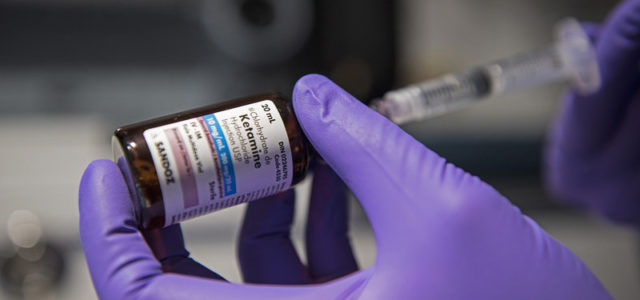Articles About Ketamine from Lori Calabrese, MD | The Ketamine Blog
Breakthrough anesthesia medicine proves life-changing for many who suffer from severe mood disorders.
In the last several years, a medicine began to emerge as a remarkable treatment for mood disorders. It was developed and FDA approved for anesthesia around 1970. Over 25 years later… it began to show its colossal hidden ability. What sort of ability? The power to relieve depression and other psychiatric disorders in a most dynamic way. Disorders like PTSD, bipolar depression, postpartum depression, addiction, social anxiety, and even eating disorders respond to this extraordinary treatment that involves a series of IV infusions. And perhaps the most remarkable of all, ketamine infusions can erase suicidal thinking in a few short hours. These articles about ketamine treatment are presented here to dispel stigma about psychiatric conditions and to give hope about treating them.
Early Testing was Cautious
Researchers tested it with trepidation 10-20 years ago. Then each study built upon the last. Their work revealed more insights about what actually causes depression, and how to treat it effectively. Never before has a medicine helped relieve symptoms in such a wide variety of people and their symptoms.
Researchers Still Learning All Ketamine Can Do
Ketamine works in multiple areas and systems of the brain. It improves the function of mechanisms that have been impaired by the stress of depression and anxiety. It helps the G proteins that pile up on lipid rafts in the cell membrane slide to off. This equips them so they can do their job enhancing signal transmission.
It also turns on the mRNA switch which in turn flips on DNA to build up brain-derived-neurotrophic-factor (BDNF). BDNF then causes synapse connections between neurons to proliferate in turbo mode, transforming and replenishing the connections between brain cells all around the brain, lighting it up with information, cognition, creativity, and insight.
There’s more that it accomplishes, like tamping down the cell bursting in the lateral habenula so you can experience the reward of pleasant moments. We don’t know what researchers haven’t discovered yet, but we look forward to hearing what’s next.
Ketamine Does More Than Bring Relief, It’s Transforming
The results of IV ketamine treatment are transformative. Those who have been weighted under a blanket of lethargic apathy and despair typically find they feel better and better after treatment. They often find they have the energy and motivation to dive into tasks they couldn’t face in recent memory.
More patients with treatment resistant conditions respond to ketamine than any other medicine available. It may sound odd, but the patients it helps the most are those who suffer the most from severe disorders. With continued research, neuroscience researchers and psychiatrists are learning methods of administration that help more and more patients enjoy a rapid and robust response,.
As a result, these individuals enjoy renewed hope. They express amazement at their energy for life and work, and an overall transformation in what they enjoy and are able to accomplish. They report a more balanced and joyful outlook, and the desire to rebuild and strengthen their relationships.
Ketamine is NOT for Everyone
With all the good IV ketamine treatment accomplishes, some people still don’t respond to it at all. The percentage of people who don’t respond is comparatively small, and we need to see more studies that can help explain why.
Why Ketamine Sometimes Doesn’t Work
There are others who have a significant response initially, then the response fades. One reason for that may be they have a deficiency of certain components in their blood. They may have a low folate level, or low testosterone, and some other deficiencies. In cases like this, sometimes replacing those nutrients helps that patient respond to ketamine treatment and experience resilience again. There are even cases where a patient’s blood levels are normal but the levels of certain components in their cerebral spinal fluid is low. By replacing that deficiency, the patient is able to enjoy a very positive and robust response to ketamine treatment.
Neuroscience is gaining knowledge by leaps and bounds in the 21st century. We hope to see more and more medicines that work as well as ketamine for those who have not yet been helped.
These articles about ketamine expand on those things we learn from neuroscience research in the labs, as well as those things we learn from research in our practice.

No Wonder Treatment Resistance Has Been Such a Mystery! Clue: Look in the Cerebral Spinal Fluid! A man in his forties, Greg had never experienced life without depression. Treating mood disorders didn’t seem to be his psychiatrist’s forte. (Oh boy…) At least not in his case. Every accomplishment, every failure, struggled for expression beneath the […]
Continue Reading

In a world where things go wrong and people get sick, every once in awhile something comes along that makes things right again. I’m talking about something that’s so dramatic in its solutions we’re tempted to call it a “miracle.” But we won’t. We’ll call it a game-changer. Because IV ketamine treatment is changing history. […]
Continue Reading

The anesthetic-cum-party drug restores the ability to make connections among brain cells. The Food and Drug Administration’s approval last month of a depression treatment based on ketamine generated headlines, in part, because the drug represents a completely new approach for dealing with a condition the World Health Organisation has labelled the leading cause of disability […]
Continue Reading

“If I see far, it’s that I stand on the shoulders of giants.” If you find yourself feeling alone and forgotten in your symptoms, feeling that there’s no one who really cares, please let me emphasize that there are hundreds, even thousands, of neuroscience researchers, medical doctors with PhDs, biochemists, psychopharmacologists, and psychiatrists who have […]
Continue Reading

Since low testosterone in men has long been presumed to accompany aging, it can be overlooked as a cause of TRD in young men. John had gained 75 lbs (!) through the stressful and exhausting project at work. He’d come to hate the way he looked. Co-workers had turned on each other, undercutting rather than […]
Continue Reading

Ketamine appears to restore faulty connections between brain cells, according to research performed in mice. The anesthetic ketamine can relieve depression in hours and keep it at bay for a week or more. Now scientists have found hints about how ketamine works in the brain. In mice, the drug appears to quickly improve the functioning […]
Continue Reading

A new study shows that weekly ketamine infusions are associated with continued and maintained reductions in depressive symptoms among patients with treatment-resistant depression. The findings, which are considered novel among studies assessing ketamine administration for patients with treatment-resistant depression, evidence the promising role the controversial drug could play in psychiatric care. A team of investigators, led […]
Continue Reading

Too much screen time? Let yourself have 2 more minutes of it right now: because if you’ve been tooling around reading anything related to mood disorders or anxiety disorders, IV ketamine, and other advanced treatments, you’ve probably noticed that there’s buzz about resilience. Because of the world that has opened up since IV ketamine began […]
Continue Reading

Two survivors of the Parkland high school shooting on Valentine’s Day 2018 took their own lives a couple weeks ago. Sydney Aiello, a senior and cheerleader at Marjory Stoneman Douglas High School, struggled to restore normalcy in her life after the terrifying experience. Her trauma, of course, included the loss of friends who were killed […]
Continue Reading

They’re different, but each can bring relief to those who suffer. As word gets out that esketamine intranasal spray has been approved by the FDA, the internet is rippling with articles, posts, interviews, newsclips and press releases about ketamine — IV ketamine, esketamine, and ketamine nasal spray. And — online forums and meeting places are […]
Continue Reading









